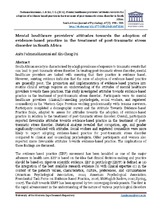Mental healthcare providers’ attitudes towards the adoption of evidence-based practice in the treatment of post-traumatic stress disorder in South Africa
Abstract
South African society is characterised by a high prevalence of exposure to traumatic events that can lead to post-traumatic stress disorder. In treating post-traumatic stress disorder, mental healthcare providers are tasked with ensuring that their practice is evidence based. However, existing evidence indicates that the rates of adoption of evidence-based practice are generally poor. The promotion and implementation of evidence-based practice into routine clinical settings requires an understanding of the attitudes of mental healthcare providers towards these practices. This study investigated attitudes towards evidence-based practice in the treatment of post-traumatic stress disorder. Participants were 60 mental healthcare providers (clinical/counselling psychologists, social workers, and registered counsellors) in the Western Cape Province working predominantly with trauma survivors. Participants completed a demographic survey and the Attitude Towards Evidence-Based Practice Scale, adapted to assess for attitudes towards the adoption of evidence-based practice in relation to the treatment of post-traumatic stress disorder. Overall, participants reported favourable attitudes towards evidence-based practice in the treatment of post-traumatic stress disorder. Statistical analysis revealed that occupation, age, and gender significantly correlated with attitudes. Social workers and registered counsellors were more likely to report adopting evidence-based practice for post-traumatic stress disorder compared to clinical and counselling psychologists. Older participants and women also reported more favourable attitudes towards evidence-based practice. The implications of these findings are discussed.

